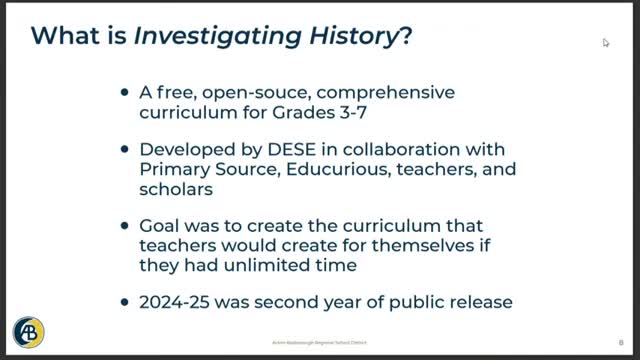District adopts DESEInvestigating History curriculum in grade 6; teachers report strong engagement
Get AI-powered insights, summaries, and transcripts
Subscribe
Summary
Acton-Boxborough is implementing Investigating History (a DESE-supported, open-source curriculum) in grade 6 this year, with plans to expand to grade 5 next year. Teachers and administrators said the inquiry-based materials have high-quality supports for differentiation, culturally responsive content and professional learning.
Gabby (district staff member) and Kate Scheibler, a sixth-grade social studies teacher, presented the district's work implementing high-quality instructional materials on Oct. 9, focusing on Investigating History, a free open-source curriculum developed with the Massachusetts Department of Elementary and Secondary Education (DESE).
"Investigating History centers students and their thinking," Kate Scheibler said. "It supports multilingual learners and students with exceptional needs and the kids find it really engaging." Scheibler described the curriculum as inquiry-based, culturally responsive and supported by background professional learning materials that help teachers who do not have specialist content backgrounds.
Why it matters: The district listed high-quality instructional materials (HQIM) as its District Improvement Goal No. 1 and explained that standards-aligned, research-based materials paired with teacher professional learning are correlated with improved student outcomes. The district has existing HQIM adoptions in mathematics and literacy and added Investigating History to support social studies instruction for grades 5–7.
Details and supporting points: Presenters said Acton-Boxborough piloted the curriculum through a DESE grant in 2023–24 and moved to full implementation for grade 6 in 2025–26; grade 5 remains in a second-year pilot and grade 7 will be the sequential continuation. The district also highlighted partnerships and funding sources that support implementation, including consultant professional learning and backing from the 1.8 Foundation.
Teachers reported student engagement with units that connect ancient civilizations to modern contexts; Scheibler read student feedback praising interactive materials and videos. Administrators described monitoring implementation through pacing guides, classroom visits and teacher surveys and said the district will continue to explore OpenSciEd for science as a complementary inquiry-based curriculum.
Implementation timeline: The district plans full implementation in grades 5 and 6 the following school year, ongoing support for grade 7, and pilot work in grades 3 and 4. Consultants and professional learning videos written in partnership with Primary Source were cited as tools to help teachers prepare content knowledge.
Questions from committee members addressed differentiation, teacher prep time and budget implications for subscription or open-source materials. Presenters said Investigating History reduces teacher prep by providing digital slide decks and linked materials and offers multi-level texts and ML-specific supports. The district signaled it will continue monitoring subscription and sustainability costs for curricular resources.
Next steps: Continue professional learning, expand implementation to adjacent grades and monitor fidelity and student outcomes through classroom visit data and teacher feedback.
